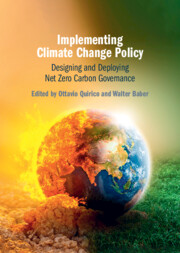Book contents
- Implementing Climate Change Policy
- Implementing Climate Change Policy
- Copyright page
- Additional material
- Dedication
- Contents
- Contributors
- Abbreviations
- Introduction
- Part I Comparing Climate Policies
- 1 The Earth’s Climate and Ongoing Global Change
- 2 Building Blocks of the European Union’s Strategy for Climate Neutrality
- 3 Environmental Constitutionalism
- 4 Avoiding Russia’s Sphere of Influence: The European Union, Energy Supply and Climate Sustainability
- 5 The USA and Climate Policies
- 6 Great Expectations
- 7 What Does ‘Green’ Mean for a Green Belt and Road?
- 8 Embracing Complexity: Water and Climate Policy in the Middle East and North Africa
- 9 Between Europe and the People’s Republic of China: Understanding Africa’s Energy Transition
- Part II Designing Effective Governance Mechanisms
- Conclusion
- Documents
- Cases
- Bibliography
- Index
8 - Embracing Complexity: Water and Climate Policy in the Middle East and North Africa
from Part I - Comparing Climate Policies
Published online by Cambridge University Press: 22 November 2024
- Implementing Climate Change Policy
- Implementing Climate Change Policy
- Copyright page
- Additional material
- Dedication
- Contents
- Contributors
- Abbreviations
- Introduction
- Part I Comparing Climate Policies
- 1 The Earth’s Climate and Ongoing Global Change
- 2 Building Blocks of the European Union’s Strategy for Climate Neutrality
- 3 Environmental Constitutionalism
- 4 Avoiding Russia’s Sphere of Influence: The European Union, Energy Supply and Climate Sustainability
- 5 The USA and Climate Policies
- 6 Great Expectations
- 7 What Does ‘Green’ Mean for a Green Belt and Road?
- 8 Embracing Complexity: Water and Climate Policy in the Middle East and North Africa
- 9 Between Europe and the People’s Republic of China: Understanding Africa’s Energy Transition
- Part II Designing Effective Governance Mechanisms
- Conclusion
- Documents
- Cases
- Bibliography
- Index
Summary
Climate change will intensify water scarcity, especially in the Middle East and North Africa (MENA). The European Union’s Green Deal ‘new growth strategy’ promotes a policy agenda that underscores the need to support regions at risk while moving forward with adaptation and mitigation measures. In MENA, transboundary water use and dispute is intrinsic to the region, exacerbating environmental risks of desertification, rising temperatures and increased rainfall variability. Water management is central to effective climate and adaptation policy, as water access is a key determinant of socioeconomic stability and development. This stability is central to intergovernmental cooperation on climate initiatives and has undermined progress on this front in the region since the 1950s. The water sector is a core aspect of climate adaptation and mitigation, particularly as the hydrological cycle will be severely impacted by climate change. Therefore, effective water policy and resource management is the critical node of effective climate mitigation and adaptation in MENA.
- Type
- Chapter
- Information
- Implementing Climate Change PolicyDesigning and Deploying Net Zero Carbon Governance, pp. 130 - 146Publisher: Cambridge University PressPrint publication year: 2024

